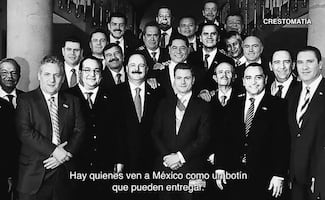Más Información

INE niega suspensión de spot de Morena que menciona a Peña y Salinas Pliego; son personas con “proyección pública”, determina

Morenistas arremeten contra Fernández de Cevallos por críticas a Sheinbaum; "yo luchaba por la democracia que usted destruye", responde

Mundial 2026: Harfuch sostiene reunión con representantes de la FIFA; coordina labores de seguridad rumbo a la Copa del Mundo

"El Güero Palma", fundador del Cártel de Sinaloa, tramita amparo; acusa incomunicación y tortura en el Altiplano
A U.S. Border Patrol agent wouldn't let Jackeline Reyes explain why she and her 15-year-old daughter fled Honduras and needed asylum , pointing to COVID-19 . The incident took place just days after the Trump administration shut down the nation's asylum system .
"The agent told us about the virus and that we couldn't go further, but she didn't let us speak or anything," said Reyes, 35, who was sent to Reynosa, Mexico, a violent border city on March 24.
Donald Trump
's administration is now relying on a rarely used public health law to set aside decades-old national and international immigration laws . People seeking refuge in the U.S. are quickly transported to the nearest border crossing and returned to Mexico without a chance to apply for asylum . It may be the most aggressive clampdown on immigration .
U.S. Customs and Border Protection said that nearly 10,000 Mexicans and Central Americans have been "expelled" to Mexico since the rules took effect on March 21. Mark Morgan, the agency's acting commissioner, said the changes were "not about immigration."
"What's happening right now is a public health crisis driven by a global pandemic, which has resulted in a national emergency declared by this President to protect the health and safety of every American in this country," he told reporters.
is providing critical support by agreeing to take migrants from Guatemala , El Salvador, and Honduras , who accounted for over half of all U.S. border arrests last year.
The Trump administration has offered little detail on the rules, which haven't been challenged in court yet. The lack of specifics means the change got little attention when it went public March 20, the same day Trump announced at a news conference that the southern border was closed to nonessential travel .
The administration tapped a law allowing the head of the Centers for Disease Control and Prevention to ban foreigners if their entry would create "a serious danger" to the spread of communicable diseases. The U.S. has the most confirmed cases in the world by far. CDC director Dr. Robert Redfield issued a 30-day order and said he may extend it.
"The administration is able to do what they always wanted to do," said Aaron Reichlin-Melnick, policy counsel for the American Immigration Council, which has criticized the administration. "I don't see this slowing down."
Recommended: The U.S. to send illegal migrants to Mexico over coronavirus fears
However, Mexico said it won't take unaccompanied children and other "vulnerable people." Carlos González Gutiérrez, Mexico's consul in San Diego, said that includes people who are over 65, pregnant, or sick.
The U.S. also is returning Central American children who travel with grandparents, siblings and other relatives, said a congressional aide who was briefed by Customs and Border Protection officials and spoke on the condition of anonymity because the information was not intended for public release. Previously, children who weren't with parents or guardians were considered unaccompanied and automatically put into the asylum pipeline.
The health risks of holding migrants in crowded spaces like Border Patrol stations is "the touchstone of this order," Redfield wrote. He said exceptions to immediately expelling someone can be considered but didn't elaborate.
"If someone is deemed to have the appropriate level of fear, those will be processed on a case-by-case basis," Morgan, the CBP acting chief, said on April 9.
An internal Border Patrol memo obtained by ProPublica offers some detail on exemptions: An agent who determines that a migrant claims a "reasonably believable" fear of being tortured can be referred for additional screening under the U.N. Convention Against Torture , a lesser form of asylum that's harder to qualify for.
Matthew Dyman, a CBP spokesman, declined to comment on the memo this week.
Under the rules, agents take migrants to the nearest border crossing in specially designated vehicles and avoid stations, minimizing the risk of exposure to coronavirus . Those not sent to Mexico are flown to their home countries.
CBP said it has less than 100 people in custody, down from a peak of more than 19,000 during last year's surge of border crossers. During the first 11 days of the new rules, 6,375 people were expelled on the Mexican border and 20 on the Canadian border.
Recommended: Mexico to delay the process to grant asylum amid the COVID-19 pandemic
Ten Senate Democrats sent a letter to acting Homeland Security Secretary Chad Wolf, who oversees border agencies, saying the Trump administration appeared to have "granted itself sweeping powers to summarily expel large, unknown numbers of individuals arriving at our border."
"A public health crisis does not give the Executive Branch a free pass to violate constitutional rights, nor does it give the Executive Branch permission to operate outside of the law," they wrote on April 7.
Additionally, many Mexican shelters have closed, leaving many stranded in violent cities or reliant on relatives in the U.S. to send money.
Trump's previous policies have targeted asylum but stopped short of suspending it altogether, acknowledging the 1951 U.N. Refugee Convention to provide a haven to displaced people and a 1980 U.S. law that established the asylum system.
Recommended: Coronavirus outbreak: Non-essential travel restricted at the Mexico-U.S. border
gm
Noticias según tus intereses
[Publicidad]
[Publicidad]









